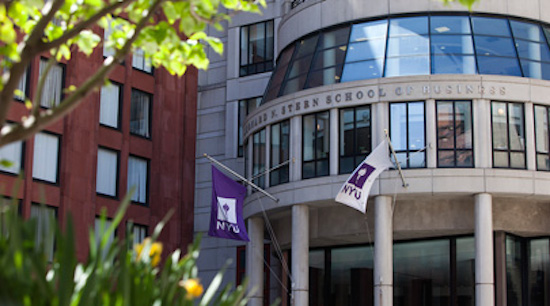The disparity in socio-economic status in America continues to increase. According to the Pew Research Center, in 1965, the average income of college graduates ages 25 to 32 was $38,833. At the same time, those with a high school diploma only made $31,384. In 2012, the average median income for college graduates in the same age range jumped to $45,500. For those with only a high school diploma, average income dropped to $28,000. A college degree (or two) has become nearly essential for a financially secure life.
What’s more, a college degree can be a good indicator if someone will experience poverty during his or her life. According to the same Pew research, only 5.8% of college graduates live in poverty compared to 21.8% of high school graduates. And poverty is the greatest indicator whether someone will go to college or not.
This past week, New York University’s Stern School of Business announced a new scholarship program. It will give 10 low-income undergraduate students the opportunity to attend Stern without incurring the burden of debt for the next four years. Alumnus Leonard R. Stern has donated $5.75 million to fund the new Leonard R. Stern New York City scholarship program aimed at high-achieving low income high school students in the city.
A SCHOOL WITH ROOTS IN SOCIAL MOBILITY
“NYU started as a school for children of immigrants and has always been a place of social mobility through education,” says Peter Henry, dean of the Stern school. “There’s a lot of concern we are moving to an age where upper mobility is not as possible as it once was. We think the best way for upper mobility is to teach the students how to fish.”
Students who are accepted to Stern and have high financial needs based on federal aid guidelines will be eligible to apply for the scholarship. If accepted, the “Stern NYC Scholars” will get aid for tuition and enrollment, as well as aid for housing and books and assistance in summer job placement.
“Stern’s gift will do two things to help the issue of social mobility,” says Henry. “First, it will bring students of great ability and modest means to the Stern School and use the values of business to create leaders. Second, if you want to address the issue of social mobility and the challenge of income inequality, get people of low income in the classroom. Get the different perspectives facing the issue.”
SOLVING A DEEPER ISSUE
According to Henry, NYU currently has around 22% of students who are considered in the low-income federal bracket. “Bringing in 10 students each year for the next four years will be a significant addition to our school.” Henry says. “But we are just one school. Other universities and schools will have to follow suit. One school alone cannot solve the challenge.”
Henry says Stern will be looking for students displaying intellectual curiosity, among other values. “We are looking for hungry students who want a chance to learn from their professors and peers,” Henry says. “They should want a chance to have access to a world-class education that puts business at the center of a broad liberal arts education. We are looking for students who want to be leaders.”
Henry believes the leadership and value creation from a degree in business can play a critical role in upward social mobility for any individual. “There’s a lot of concern in our society in what to do with this issue,” Henry says. “We know the best way is to create more college educated students. We just believe that creating these kinds of educational opportunities will go a lot further than anything else you can do in aiding social mobility.”
DON’T MISS: B-SCHOOL PROFS GIVING MILLIONS TO THEIR SCHOOLS












Questions about this article? Email us or leave a comment below.